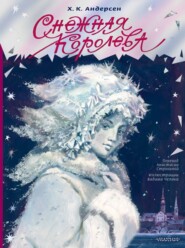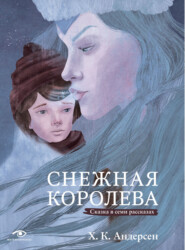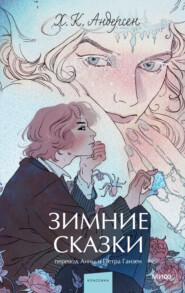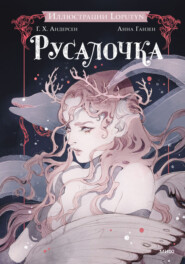По всем вопросам обращайтесь на: info@litportal.ru
(©) 2003-2024.
✖
Wonderful Stories for Children
Настройки чтения
Размер шрифта
Высота строк
Поля
"Yes, to be sure!" said Yalmar; and in a moment he was dressed up like the most beautiful new tin soldier.
"Will you be so good as to seat yourself in your mother's thimble," said the little mouse; "and then I shall have the honor of driving you!"
"Goodness!" said Yalmar; "will the young lady herself take the trouble?" and with that they drove to the mouse's wedding.
First of all, after going under the floor, they came into a long passage, which was so low that they could hardly drive in the thimble, and the whole passage was illuminated with touchwood.
"Does it not smell delicious?" said the mouse as they drove along; "the whole passage has been rubbed with bacon-sward; nothing can be more delicious!"
They now came into the wedding-hall. On the right hand stood the little she-mice, and they all whispered and tittered as if they were making fun of one another; on the left hand all the he-mice, and stroked their mustachios with their paws. In the middle of the floor were to be seen the bridal pair, who stood in a hollow cheese-paring; and they kept kissing one another before everybody, for they were desperately in love, and were going to be married directly.
And all this time there kept coming in more and more strangers, till one mouse was ready to trample another to death; and the bridal pair had placed themselves in a doorway, so that people could neither go in nor come out. The whole room, like the passage, had been smeared with sward of bacon; that was all the entertainment: but as a dessert a pea was produced, on which a little mouse of family had bitten the name of the bridal pair, – that is to say, the first letters of their name; that was something quite out of the common way.
All the mice said that it was a charming wedding, and that the conversation had been so good!
Yalmar drove home again; he had really been in very grand society, but he must have been regularly squeezed together to make himself small enough for a tin soldier's uniform.
FRIDAY
"It is incredible how many elderly people there are who would be so glad of me," said Olé Luckoiè, "especially those who have done any thing wrong. 'Good little Olé,' say they to me, 'we cannot close our eyes; and so we lie all night long awake, and see all our bad deeds, which sit, like ugly little imps, on the bed's head, and squirt hot water on us. Wilt thou only just come and drive them away, that we may have a good sleep!' and with that they heave such deep sighs – 'we would so gladly pay thee; good-night, Olé!' Silver pennies lie for me in the window," said Olé Luckoiè, "but I do not give sleep for money!"
"Now what shall we have to-night?" inquired Yalmar.
"I do not know whether thou hast any desire to go again to-night to a wedding," said Olé Luckoiè; "but it is of a different kind to that of last night. Thy sister's great doll, which is dressed like a gentleman, and is called Herman, is going to be married to the doll Bertha; besides, it is the doll's birthday, and therefore there will be a great many presents made."
"Yes, I know," said Yalmar; "always, whenever the dolls have new clothes, my sister entreats that they have a birthday or a wedding; that has happened certainly a hundred times!"
"Yes, but to-night it is the hundred and first wedding, and when a hundred and one is done then all is over! Therefore it will be incomparably grand. Only look!"
Yalmar looked at the table; there stood the little doll's house with lights in the windows, and all the tin soldiers presented arms outside. The bridal couple sat upon the floor, and leaned against the table-legs, and looked very pensive, and there might be reason for it. But Olé Luckoiè, dressed in the grandmother's black petticoat, married them, and when they were married, all the furniture in the room joined in the following song, which was written in pencil, and which was sung to the tune of the drum: —
Our song like a wind comes flitting
Into the room where the bride-folks are sitting;
They are partly of wood, as is befitting:
Their skin is the skin of a glove well fitting!
Hurrah, hurrah! for sitting and fitting!
Thus sing we aloud as the wind comes flitting!
And now the presents were brought, but they had forbidden any kind of eatables, for their love was sufficient for them.
"Shall we stay in the country, or shall we travel into foreign parts?" asked the bridegroom; and with that they begged the advice of the breeze, which had travelled a great deal, and of the old hen, which had had five broods of chickens. The breeze told them about the beautiful, warm countries where the bunches of grapes hung so large and so heavy; where the air was so mild, and the mountains had colors of which one could have no idea "in this country."
"But there they have not our green cabbage!" said the hen. "I lived for one summer with all my chickens in the country; there was a dry, dusty ditch in which we could go and scuttle, and we had admittance to a garden where there was green cabbage! O, how green it was! I cannot fancy any thing more beautiful!"
"But one cabbage-stalk looks just like another," said the breeze; "and then there is such wretched weather here."
"Yes, but one gets used to it," said the hen.
"But it is cold – it freezes!"
"That is good for the cabbage!" said the hen. "Besides, we also have it warm. Had not we four years ago a summer which lasted five weeks, and it was so hot that people did not know how to bear it? And then we have not all the poisonous creatures which they have there! and we are far from robbers. He is a good-for-nothing fellow who does not think our country the most beautiful in the world! and he does not deserve to be here!" and with that the hen cried. – "And I also have travelled," continued she; "I have gone in a boat above twelve miles; there is no pleasure in travelling."
"The hen is a sensible body!" said the doll Bertha; "I would rather not travel to the mountains, for it is only going up to come down again. No! we will go down into the ditch, and walk in the cabbage-garden."
And so they did.
SATURDAY
"Shall I have any stories?" said little Yalmar, as soon as Olé Luckoiè had put him to sleep.
"In the evening we have no time for any," said Olé, and spread out his most beautiful umbrella above his head. "Look now at this Chinese scene!" and with that the whole inside of the umbrella looked like a great china saucer, with blue trees and pointed bridges, on which stood little Chinese, who stood and nodded with their heads. "We shall have all the world dressed up beautifully this morning," said Olé, "for it is really a holiday; it is Sunday. I shall go up into the church towers to see whether the little church-elves polish the bells, because they sound so sweetly. I shall go out into the market, and see whether the wind blows the dust, and grass, and leaves, and what is the hardest work there. I shall have all the stars down to polish them; I shall put them into my apron, but first of all I must have them all numbered, and the holes where they fit up there numbered also; else we shall never put them into their proper places again, and then they will not be firm, and we shall have so many falling stars, one dropping down after another!"
"Hear, you Mr. Luckoiè, there!" said an old portrait that hung on the wall of the room where Yalmar slept: "I am Yalmar's grandfather. We are obliged to you for telling the boy pretty stories, but you must not go and confuse his ideas. The stars cannot be taken down and polished! The stars are globes like our earth, and they want nothing doing at them!"
"Thou shalt have thanks, thou old grandfather," said Olé Luckoiè; "thanks thou shalt have! Thou art, to be sure, the head of the family; thou art the old head of the family; but for all that, I am older than thou! I am an old heathen; the Greeks and the Romans called me the god of dreams. I go into great folks' houses, and I shall go there still. I know how to manage both with young and old. But now thou mayst take thy turn." And with this Olé Luckoiè went away, and took his umbrella with him.
"Now, one cannot tell what he means!" said the old Portrait.
And Yalmar awoke.
SUNDAY
"Good-evening!" said Olé Luckoiè, and Yalmar nodded; but he jumped up and turned the grandfather's portrait to the wall, that it might not chatter as it had done the night before.
"Now thou shalt tell me a story," said Yalmar, "about the five peas that live in one pea-pod, and about Hanebeen who cured Honebeen; and about the darning-needle, that was so fine that it fancied itself a sewing-needle."
"One might do a deal of good by so doing," said Olé Luckoiè; "but, dost thou know, I would rather show thee something. I will show thee my brother; he also is called Olé Luckoiè. He never comes more than once to anybody, – and when he comes he takes the person away with him on his horse, and tells him a great and wonderful history. But he only knows two, one of them is the most incomparably beautiful story, so beautiful that nobody in the world can imagine it; and the other is so dismal and sad – oh, it is impossible to describe how sad!"
Having said this, Olé Luckoiè lifted little Yalmar up to the window and said, "There thou mayst see my brother, the other Olé Luckoiè! They call him Death! Dost thou see, he does not look horrible as they have painted him in picture-books, like a skeleton; no, his coat is embroidered with silver; he wears a handsome Hussar uniform! A cloak of black velvet flies behind, over his horse. See how he gallops!"
Yalmar looked, and saw how the other Olé Luckoiè rode along, and took both young and old people with him on his horse. Some he set before him, and some he set behind; but his first question always was, "How does it stand in your character-book?"
Everybody said, "Good!"
"Yes! let me see myself," said he; and they were obliged to show him their books: and all those in whose books were written, "Very good!" or "Remarkably good!" he placed before him on his horse; and they listened to the beautiful story that he could tell. But they in whose books was written, "Not very good," or "Only middling," they had to sit behind and listen to the dismal tale. These wept bitterly, and would have been glad to have got away, that they might have amended their characters; but it was then too late.
"Death is, after all, the most beautiful Olé Luckoiè," said Yalmar; "I shall not be afraid of him."
"Thou need not fear him," said Olé Luckoiè, "if thou only take care and have a good character-book."
"There is instruction in that," mumbled the old grandfather's portrait; "that is better: one sees his meaning!" and he was pleased.
See, this is the story about Olé Luckoiè. This night, perhaps, he may tell thee some others.
THE DAISY
Now thou shalt hear! – Out in the country, close by the high road, there stood a pleasure-house, – thou hast, no doubt, seen it thyself. In the front is a little garden full of flowers, and this is fenced in with painted palisades. Close beside these, in a hollow, there grew, all among the loveliest green grass, a little tuft of daisies. The sun shone upon it just as warmly and as sweetly as upon the large and rich splendid flowers within the garden, and, therefore, it grew hour by hour. One morning it opened its little shining white flower-leaves, which looked just like rays of light all round the little yellow sun in the inside. It never once thought that nobody saw it down there in the grass, and that it was a poor, despised flower! No, nothing of the kind! It was so very happy; turned itself round towards the warm sun, looked up, and listened to the lark which sang in the blue air.
The little daisy was as happy as if it had been some great holiday, and yet it was only a Monday. All the children were in school, and while they sat upon the benches learning their lessons, it also sat upon its little green stalk, and learned from the warm sun and from every thing around it, how good God is. And it seemed to it quite right that the little lark sang so intelligibly and so beautifully every thing which it felt in stillness; and it looked up with a sort of reverence to the happy bird, which could sing and fly, but it was not at all vexed because it could not do the same.
"Will you be so good as to seat yourself in your mother's thimble," said the little mouse; "and then I shall have the honor of driving you!"
"Goodness!" said Yalmar; "will the young lady herself take the trouble?" and with that they drove to the mouse's wedding.
First of all, after going under the floor, they came into a long passage, which was so low that they could hardly drive in the thimble, and the whole passage was illuminated with touchwood.
"Does it not smell delicious?" said the mouse as they drove along; "the whole passage has been rubbed with bacon-sward; nothing can be more delicious!"
They now came into the wedding-hall. On the right hand stood the little she-mice, and they all whispered and tittered as if they were making fun of one another; on the left hand all the he-mice, and stroked their mustachios with their paws. In the middle of the floor were to be seen the bridal pair, who stood in a hollow cheese-paring; and they kept kissing one another before everybody, for they were desperately in love, and were going to be married directly.
And all this time there kept coming in more and more strangers, till one mouse was ready to trample another to death; and the bridal pair had placed themselves in a doorway, so that people could neither go in nor come out. The whole room, like the passage, had been smeared with sward of bacon; that was all the entertainment: but as a dessert a pea was produced, on which a little mouse of family had bitten the name of the bridal pair, – that is to say, the first letters of their name; that was something quite out of the common way.
All the mice said that it was a charming wedding, and that the conversation had been so good!
Yalmar drove home again; he had really been in very grand society, but he must have been regularly squeezed together to make himself small enough for a tin soldier's uniform.
FRIDAY
"It is incredible how many elderly people there are who would be so glad of me," said Olé Luckoiè, "especially those who have done any thing wrong. 'Good little Olé,' say they to me, 'we cannot close our eyes; and so we lie all night long awake, and see all our bad deeds, which sit, like ugly little imps, on the bed's head, and squirt hot water on us. Wilt thou only just come and drive them away, that we may have a good sleep!' and with that they heave such deep sighs – 'we would so gladly pay thee; good-night, Olé!' Silver pennies lie for me in the window," said Olé Luckoiè, "but I do not give sleep for money!"
"Now what shall we have to-night?" inquired Yalmar.
"I do not know whether thou hast any desire to go again to-night to a wedding," said Olé Luckoiè; "but it is of a different kind to that of last night. Thy sister's great doll, which is dressed like a gentleman, and is called Herman, is going to be married to the doll Bertha; besides, it is the doll's birthday, and therefore there will be a great many presents made."
"Yes, I know," said Yalmar; "always, whenever the dolls have new clothes, my sister entreats that they have a birthday or a wedding; that has happened certainly a hundred times!"
"Yes, but to-night it is the hundred and first wedding, and when a hundred and one is done then all is over! Therefore it will be incomparably grand. Only look!"
Yalmar looked at the table; there stood the little doll's house with lights in the windows, and all the tin soldiers presented arms outside. The bridal couple sat upon the floor, and leaned against the table-legs, and looked very pensive, and there might be reason for it. But Olé Luckoiè, dressed in the grandmother's black petticoat, married them, and when they were married, all the furniture in the room joined in the following song, which was written in pencil, and which was sung to the tune of the drum: —
Our song like a wind comes flitting
Into the room where the bride-folks are sitting;
They are partly of wood, as is befitting:
Their skin is the skin of a glove well fitting!
Hurrah, hurrah! for sitting and fitting!
Thus sing we aloud as the wind comes flitting!
And now the presents were brought, but they had forbidden any kind of eatables, for their love was sufficient for them.
"Shall we stay in the country, or shall we travel into foreign parts?" asked the bridegroom; and with that they begged the advice of the breeze, which had travelled a great deal, and of the old hen, which had had five broods of chickens. The breeze told them about the beautiful, warm countries where the bunches of grapes hung so large and so heavy; where the air was so mild, and the mountains had colors of which one could have no idea "in this country."
"But there they have not our green cabbage!" said the hen. "I lived for one summer with all my chickens in the country; there was a dry, dusty ditch in which we could go and scuttle, and we had admittance to a garden where there was green cabbage! O, how green it was! I cannot fancy any thing more beautiful!"
"But one cabbage-stalk looks just like another," said the breeze; "and then there is such wretched weather here."
"Yes, but one gets used to it," said the hen.
"But it is cold – it freezes!"
"That is good for the cabbage!" said the hen. "Besides, we also have it warm. Had not we four years ago a summer which lasted five weeks, and it was so hot that people did not know how to bear it? And then we have not all the poisonous creatures which they have there! and we are far from robbers. He is a good-for-nothing fellow who does not think our country the most beautiful in the world! and he does not deserve to be here!" and with that the hen cried. – "And I also have travelled," continued she; "I have gone in a boat above twelve miles; there is no pleasure in travelling."
"The hen is a sensible body!" said the doll Bertha; "I would rather not travel to the mountains, for it is only going up to come down again. No! we will go down into the ditch, and walk in the cabbage-garden."
And so they did.
SATURDAY
"Shall I have any stories?" said little Yalmar, as soon as Olé Luckoiè had put him to sleep.
"In the evening we have no time for any," said Olé, and spread out his most beautiful umbrella above his head. "Look now at this Chinese scene!" and with that the whole inside of the umbrella looked like a great china saucer, with blue trees and pointed bridges, on which stood little Chinese, who stood and nodded with their heads. "We shall have all the world dressed up beautifully this morning," said Olé, "for it is really a holiday; it is Sunday. I shall go up into the church towers to see whether the little church-elves polish the bells, because they sound so sweetly. I shall go out into the market, and see whether the wind blows the dust, and grass, and leaves, and what is the hardest work there. I shall have all the stars down to polish them; I shall put them into my apron, but first of all I must have them all numbered, and the holes where they fit up there numbered also; else we shall never put them into their proper places again, and then they will not be firm, and we shall have so many falling stars, one dropping down after another!"
"Hear, you Mr. Luckoiè, there!" said an old portrait that hung on the wall of the room where Yalmar slept: "I am Yalmar's grandfather. We are obliged to you for telling the boy pretty stories, but you must not go and confuse his ideas. The stars cannot be taken down and polished! The stars are globes like our earth, and they want nothing doing at them!"
"Thou shalt have thanks, thou old grandfather," said Olé Luckoiè; "thanks thou shalt have! Thou art, to be sure, the head of the family; thou art the old head of the family; but for all that, I am older than thou! I am an old heathen; the Greeks and the Romans called me the god of dreams. I go into great folks' houses, and I shall go there still. I know how to manage both with young and old. But now thou mayst take thy turn." And with this Olé Luckoiè went away, and took his umbrella with him.
"Now, one cannot tell what he means!" said the old Portrait.
And Yalmar awoke.
SUNDAY
"Good-evening!" said Olé Luckoiè, and Yalmar nodded; but he jumped up and turned the grandfather's portrait to the wall, that it might not chatter as it had done the night before.
"Now thou shalt tell me a story," said Yalmar, "about the five peas that live in one pea-pod, and about Hanebeen who cured Honebeen; and about the darning-needle, that was so fine that it fancied itself a sewing-needle."
"One might do a deal of good by so doing," said Olé Luckoiè; "but, dost thou know, I would rather show thee something. I will show thee my brother; he also is called Olé Luckoiè. He never comes more than once to anybody, – and when he comes he takes the person away with him on his horse, and tells him a great and wonderful history. But he only knows two, one of them is the most incomparably beautiful story, so beautiful that nobody in the world can imagine it; and the other is so dismal and sad – oh, it is impossible to describe how sad!"
Having said this, Olé Luckoiè lifted little Yalmar up to the window and said, "There thou mayst see my brother, the other Olé Luckoiè! They call him Death! Dost thou see, he does not look horrible as they have painted him in picture-books, like a skeleton; no, his coat is embroidered with silver; he wears a handsome Hussar uniform! A cloak of black velvet flies behind, over his horse. See how he gallops!"
Yalmar looked, and saw how the other Olé Luckoiè rode along, and took both young and old people with him on his horse. Some he set before him, and some he set behind; but his first question always was, "How does it stand in your character-book?"
Everybody said, "Good!"
"Yes! let me see myself," said he; and they were obliged to show him their books: and all those in whose books were written, "Very good!" or "Remarkably good!" he placed before him on his horse; and they listened to the beautiful story that he could tell. But they in whose books was written, "Not very good," or "Only middling," they had to sit behind and listen to the dismal tale. These wept bitterly, and would have been glad to have got away, that they might have amended their characters; but it was then too late.
"Death is, after all, the most beautiful Olé Luckoiè," said Yalmar; "I shall not be afraid of him."
"Thou need not fear him," said Olé Luckoiè, "if thou only take care and have a good character-book."
"There is instruction in that," mumbled the old grandfather's portrait; "that is better: one sees his meaning!" and he was pleased.
See, this is the story about Olé Luckoiè. This night, perhaps, he may tell thee some others.
THE DAISY
Now thou shalt hear! – Out in the country, close by the high road, there stood a pleasure-house, – thou hast, no doubt, seen it thyself. In the front is a little garden full of flowers, and this is fenced in with painted palisades. Close beside these, in a hollow, there grew, all among the loveliest green grass, a little tuft of daisies. The sun shone upon it just as warmly and as sweetly as upon the large and rich splendid flowers within the garden, and, therefore, it grew hour by hour. One morning it opened its little shining white flower-leaves, which looked just like rays of light all round the little yellow sun in the inside. It never once thought that nobody saw it down there in the grass, and that it was a poor, despised flower! No, nothing of the kind! It was so very happy; turned itself round towards the warm sun, looked up, and listened to the lark which sang in the blue air.
The little daisy was as happy as if it had been some great holiday, and yet it was only a Monday. All the children were in school, and while they sat upon the benches learning their lessons, it also sat upon its little green stalk, and learned from the warm sun and from every thing around it, how good God is. And it seemed to it quite right that the little lark sang so intelligibly and so beautifully every thing which it felt in stillness; and it looked up with a sort of reverence to the happy bird, which could sing and fly, but it was not at all vexed because it could not do the same.

















